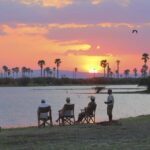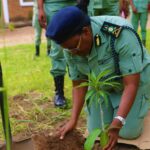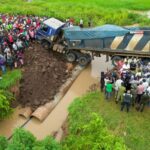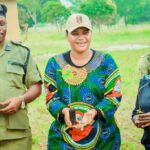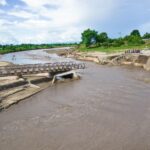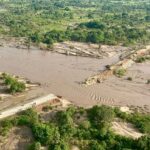Saving Mount Kilimanjaro: A United Effort Led by Hon. Khamis Hamza Khamis and Zephania Sumaye
Mount Kilimanjaro, the highest peak in Africa and one of the most iconic natural landmarks in the world, is facing a significant threat from climate change. In response to this pressing issue, a significant campaign has been initiated with the objective of mitigating the adverse effects of climate change on this majestic mountain. The campaign, spearheaded by the non-governmental organisation Nessa, has the objective of planting one billion trees across the regions of Kilimanjaro, Arusha, Manyara, and Tanga. This ambitious initiative aims to ensure the preservation of Mount Kilimanjaro’s natural beauty and ecological balance for future generations.
On a morning characterised by optimism, the Deputy Minister of the Office of the Vice President (Union and Environment), Hon. Khamis Hamza Khamis, collaborated with the Head of Moshi District, Zephania Sumaye, to participate in a charity walk designed to raise awareness and support for this commendable cause. The walk, which permitted participants to select a distance of either 5, 10, or 16 kilometres, commenced at the Marangu gate and concluded in the Mandara area. In excess of 300 stakeholders, comprising environmentalists, local community members and international supporters, participated in this event, thereby demonstrating a unified stance in the fight against climate change.
The Significance of the Charity Walk
The Charity Walk was not merely a physical journey; it was also a symbolic one. It symbolised the collective endeavour required to combat climate change and safeguard Mount Kilimanjaro. The route of the walk, which commenced at the Marangu gate and concluded in the Mandara area, was meticulously selected to exemplify the region’s natural splendour and the imperative for conservation initiatives.
The participants in the walk were greeted with views of the surrounding area that were described as breathtaking, featuring lush forests, diverse wildlife, and the towering peak of Mount Kilimanjaro. These observations served as a poignant reminder of the potential consequences of continued unabated climate change. Furthermore, the walk offered a valuable opportunity for participants to engage with local communities, gain insight into their challenges, and recognise the significance of environmental preservation for their livelihoods.
The Role of Hon. Khamis Hamza Khamis
The Honourable Khamis Hamza Khamis, Deputy Minister of the Office of the Vice President (Union and Environment), played a pivotal role in the Charity Walk. His presence served to underscore the government’s commitment to addressing climate change and supporting environmental conservation initiatives. During the course of the walk, the Honourable Khamis Hamza Khamis took the opportunity to plant a Kilimanjaro Peanut tree, thereby symbolising the commencement of the campaign’s ambitious objective to plant one billion trees.
In his address to the participants, Hon. Khamis Hamza Khamis underscored the necessity of collective action in addressing climate change. Furthermore, he emphasised the government’s initiatives to implement policies and programmes with the objective of reducing carbon emissions, promoting sustainable land use and enhancing reforestation efforts. Furthermore, he urged local communities, businesses, and international partners to collaborate in this crucial endeavour.
The Vision of Nessa
The non-governmental organisation (NGO) responsible for the campaign has a clearly defined and persuasive vision for the future. The objective is to plant one billion trees across the regions of Kilimanjaro, Arusha, Manyara, and Tanga. This ambitious objective is not merely the planting of trees; it is the creation of a sustainable and resilient ecosystem that will withstand the impacts of climate change.
The Nessa approach is holistic and community-driven. They collaborate closely with local communities to identify suitable areas for reforestation, provide training on sustainable land management practices, and ensure that the planted trees are cared for and nurtured. By engaging local communities at each stage of the process, Nessa seeks to foster a sense of ownership and responsibility, thereby ensuring the long-term success of the campaign.
The Importance of Reforestation
The reforestation of Mount Kilimanjaro is a fundamental element of the campaign to preserve this natural landmark. Trees play an indispensable role in combating climate change, as they absorb carbon dioxide, provide oxygen, and stabilise the soil. Furthermore, they facilitate the creation of habitats for wildlife, support biodiversity, and contribute to the overall health of the ecosystem.
The regions of Kilimanjaro, Arusha, Manyara, and Tanga have been identified as areas of particular ecological significance and vulnerability to climate change, and thus as key areas for reforestation. The objective of the campaign is to restore degraded landscapes, enhance water catchment areas and create green corridors that connect fragmented habitats by planting one billion trees in these regions.
Community Involvement and Empowerment
One of the most inspiring aspects of the campaign is the active involvement and empowerment of local communities, which is a notable feature of the initiative. Nessa acknowledges the necessity of sustainable conservation efforts, which require the support and participation of the people who live in and depend on these ecosystems. Consequently, a variety of programs have been implemented with the objective of engaging and empowering local communities.
Such programmes encompass initiatives pertaining to environmental education, training in sustainable agricultural and land management practices, and the establishment of community nurseries. By equipping communities with the requisite knowledge and resources to safeguard their environment, Nessa ensures that the campaign’s impact is both immediate and long-lasting.
Tanzania Media
- Kanyala Ferry Launch: TEMESA’s New Service for 15,000 Sengerema Residents (Mwanza) - 18 August 2025
- Russia-Tanzania Naval Cooperation: How the Smolny Training Ship Boosts Dar es Salaam’s Maritime Security - 18 August 2025
- Tanzania’s ICGLR Commitment: Stabilising the DRC & Great Lakes Region - 18 August 2025








